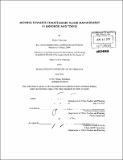| dc.contributor.advisor | JoAnn Carmin. | en_US |
| dc.contributor.author | Takemoto, Shoko, M.C.P. Massachusetts Institute of Technology | en_US |
| dc.contributor.other | Massachusetts Institute of Technology. Dept. of Urban Studies and Planning. | en_US |
| dc.coverage.spatial | a-th--- a-ja--- | en_US |
| dc.date.accessioned | 2011-11-18T21:18:59Z | |
| dc.date.available | 2011-11-18T21:18:59Z | |
| dc.date.copyright | 2011 | en_US |
| dc.date.issued | 2011 | en_US |
| dc.identifier.uri | http://hdl.handle.net/1721.1/67243 | |
| dc.description | Thesis (M.C.P.)--Massachusetts Institute of Technology, Dept. of Urban Studies and Planning, 2011. | en_US |
| dc.description | Cataloged from PDF version of thesis. | en_US |
| dc.description | Includes bibliographical references (p. 84-87). | en_US |
| dc.description.abstract | Managing the impacts of climate change is no longer a concern of the future, but a significant reality of the present. Preparing for, and mitigating extreme weather events and adapting to the gradual shift in climatic trends are pressing concerns, especially for local governments of coastal megacities in Asia. Planning for disaster and climate change is a fundamental city function, and there is an urgent need for cities to enhance their disaster management systems to be "climate-smart," or more adaptive and resilient to climate change. In this study, I examine how two coastal megacities in Asia, Bangkok and Tokyo, are currently dealing with the changing climate and weather patterns, and what factors shape these responses. My findings show that, despite their significant differences in socioeconomic conditions, Bangkok and Tokyo's flood management efforts are very similar in terms of what they are managing and how they are managing it. Furthermore, whether a city is developed or developing may not necessarily influence existing capacities for flood management or what their climate-adapted systems may look like. However, Bangkok and Tokyo have distinct perceptions as to what their challenges and priorities are for future flood management. In the case of Bangkok, the non-climatic issues of improving urban planning and watershed management need to be tackled simultaneously with dealing with the potential impacts of climate change. For Tokyo, because they already have established urban planning and watershed management systems, figuring out how to manage future climate risks and to create a methodology to deal with uncertainty within long-term planning are the key challenges. Through this study, I argue that, in order to better integrate climate change adaptation efforts within disaster and flood management, it is important to closely examine how cities are already managing climate vulnerability and change, what factors shape their approach, and how climate change adaptation can fit within their actions and perceptions towards future planning. Given the recent Great East Japan Earthquake and other natural disasters, asking the question of what cities are adapting to, and why they are adapting could be the effective, first steps for enabling cities to become climate-smart. | en_US |
| dc.description.statementofresponsibility | by Shoko Takemoto. | en_US |
| dc.format.extent | 87 p. | en_US |
| dc.language.iso | eng | en_US |
| dc.publisher | Massachusetts Institute of Technology | en_US |
| dc.rights | M.I.T. theses are protected by
copyright. They may be viewed from this source for any purpose, but
reproduction or distribution in any format is prohibited without written
permission. See provided URL for inquiries about permission. | en_US |
| dc.rights.uri | http://dspace.mit.edu/handle/1721.1/7582 | en_US |
| dc.subject | Urban Studies and Planning. | en_US |
| dc.title | Moving towards climate-smart flood management in Bangkok and Tokyo | en_US |
| dc.type | Thesis | en_US |
| dc.description.degree | M.C.P. | en_US |
| dc.contributor.department | Massachusetts Institute of Technology. Department of Urban Studies and Planning | |
| dc.identifier.oclc | 759125238 | en_US |
